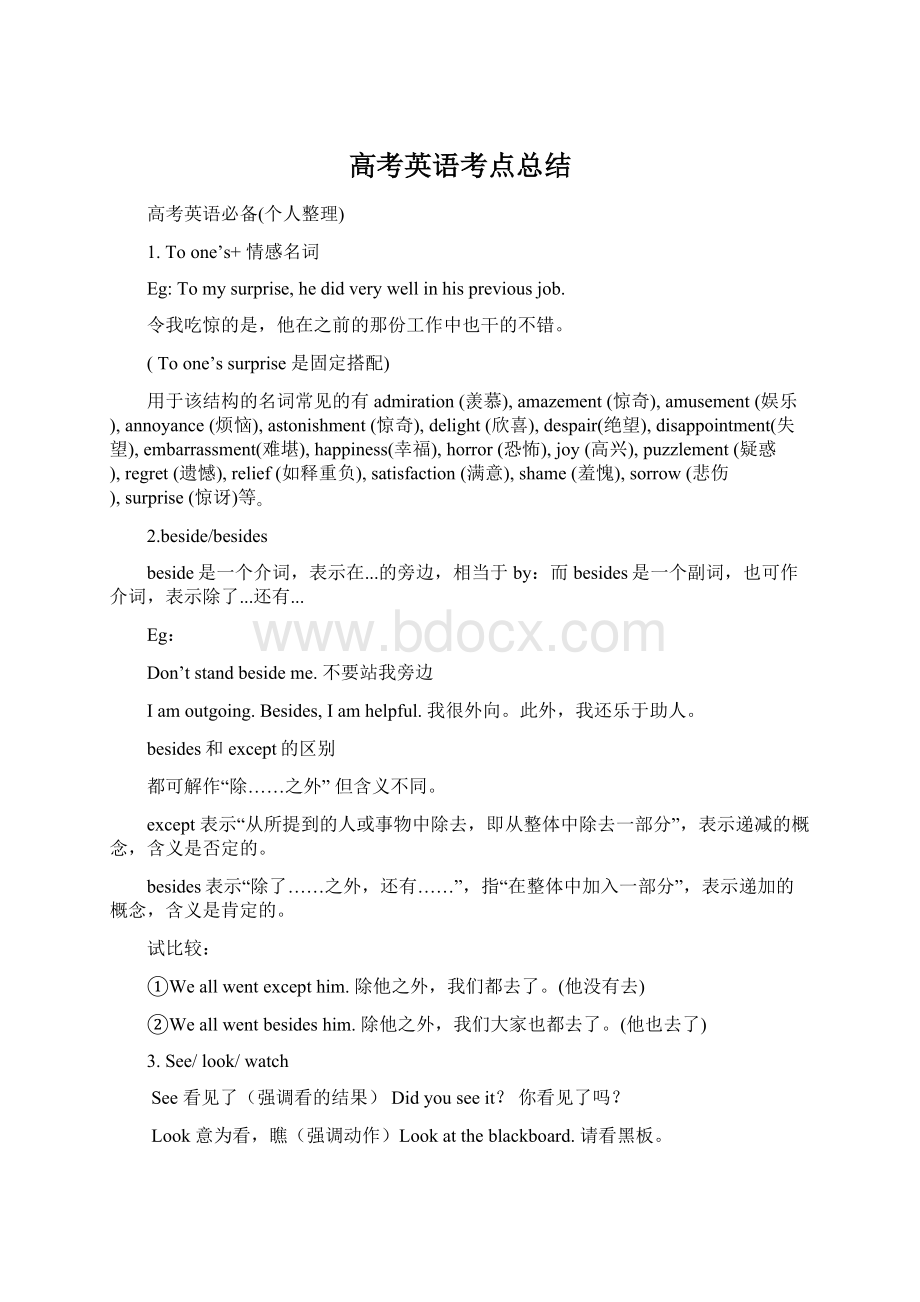高考英语考点总结Word格式.docx
《高考英语考点总结Word格式.docx》由会员分享,可在线阅读,更多相关《高考英语考点总结Word格式.docx(16页珍藏版)》请在冰豆网上搜索。

(恐怖),
joy
(高兴),
puzzlement
(疑惑),
regret
(遗憾),
relief
(如释重负),
satisfaction
(满意),
shame
(羞愧),
sorrow
(悲伤),
(惊讶)等。
2.beside/besides
beside是一个介词,表示在...的旁边,相当于by:
而besides是一个副词,也可作介词,表示除了...还有...
Eg:
Don’tstandbesideme.不要站我旁边
Iamoutgoing.Besides,Iamhelpful.我很外向。
此外,我还乐于助人。
besides和except的区别
都可解作“除……之外”但含义不同。
except表示“从所提到的人或事物中除去,即从整体中除去一部分”,表示递减的概念,含义是否定的。
besides表示“除了……之外,还有……”,指“在整体中加入一部分”,表示递加的概念,含义是肯定的。
试比较:
①Weallwentexcepthim.除他之外,我们都去了。
(他没有去)
②Weallwentbesideshim.除他之外,我们大家也都去了。
(他也去了)
3.See/look/watch
See看见了(强调看的结果)Didyouseeit?
你看见了吗?
Look意为看,瞧(强调动作)Lookattheblackboard.请看黑板。
Watch观看,注视(形容观看的内容比较精彩,比较有过程)watchagame/watchafight看比赛,观看打斗(看得东西都比较有内容)
常见短语:
seesbdoingsth(看见某人正在做...,doing作sb的宾补)
seesbdosth(看见某人做了...,强调看了整个过程)
Seeamovie/film看电影
Looklike看起来像.../Lookfor...寻找.../havealookat
看一看/lookat看着(glareat怒视/stareat盯着看/glanceat一瞥)
WatchTV看电视lookout=watchout担心,小心
4.Hear/listen
Listen不及物动词,表示有意识地听、仔细听,强调的是听的动作
Listentomusic听歌
Listentome.听我讲。
Hear及物动词,强调听的结果Ican’thearyou!
我听不见你。
5.So/such
such与so的意思都是“如此,这样”.但两者用法根本不同,与what和how引导的感叹句相类似.
1、such后面主要是修饰名词.即:
such+a/an+adj.+n.或a/an+such+adj.+n..如果名词是不可数名词或复数名词,则不可以用不定冠词a或an.如:
①Hehassuchabeautifulbike.Weallgotoseeit.
②It'
sasuchfineday.Weallwanttogotoflyakite.
2、so后面只能跟形容词或副词.即:
和so+adj.或adv.不过,so后面也可以跟名词,但该名词必须是单数可数名词.用法为:
so+形容词+a或an+单数可数名词.如:
①Thetigerissobig.Andthecatissosmall.
②Sheissolovelyagirl.
3、它们后面还可以与that从句连用.即:
such…that和so…that意思是“如此……以致……”.如:
①Sheissuchaclevergirlthatshecanmakemuchprogressinmathexam.
②Hisbrotherissoyoungthathecan'
tgotoschool.
注:
当名词前的形容词为表示数目的词时,such必须换成so.如:
①Therearesomanypeoplethatwecan'
tgopast.
②IatesomuchfoodthatIdidn'
twanttogoanyfarther.
6.how/what(howabout=whatabout...怎么样?
)
what、how常用于感叹句
感叹句一般是用来表示说话时的喜悦、惊讶等情感。
英语感叹句常用"
what"
和"
how"
引导,"
与所修饰的词置于句首,其它部分用陈述句语序。
一、由"
引导的感叹句:
"
意为"
多么"
用作定语,修饰名词(被强调部分),单数可数名词前要加不定冠词a/an,复数可数名词或不可数名词前不用冠词。
这类句子的结构形式是:
what+(a/an)+adj.+n.+主语+谓语+(itis).
如:
①Whataclevergirlsheis!
多么聪明的姑娘呀!
②Whataninterestingstoryitis!
多么有趣的故事呀!
③Whatdeliciousfooditis!
多么有味的食物呀!
二、由"
,用作状语,修饰形容词或副词(被强调部分)。
如果修饰形容词,则句中的谓语动词用系动词;
如果how修饰副词,则句中的谓语动词用行为动词,这类句子的结构形式是:
How+adj.(adv.)+主语+谓语+(itis).
①Howcolditistoday!
今天多么冷呀!
②Howwellshesings!
她唱得多好呀!
三、在表示同一意义时,英语感叹既可用"
引导,也可用"
引导。
①Whatahotdayitis!
=Howhotthedayis!
多么热的天气呀!
②Whatbadweatheritis!
=Howbadtheweatheris!
多么糟糕的天气呀!
四.Whatdoyoudo?
你是做什么的Howdoyoudoit?
你是怎样做的
7.Sometimes,sometime和sometime的区别
(1)sometimes的意思是“有时”,是副词.例如:
Sometimeshecomesbybikeandsometimesbybus.
他有时骑车来,有时乘公共汽车来.
(2)sometime也是副词,意思是“在某个时候”.可用于一般过去时与将来时.例如:
YoucanhandinyourhomeworksometimebeforeFriday.
你可以在周五前某个时候交作业.
(3)sometime是名词短语,它的意思是“一段时间”.例如:
I'
llbeawayforsometime.我将离开一段时间.
8.表示“非常多”修饰可数名词复数或不可数名词
不可数名词前可用:
much,alittle,agreatdealof,alargeamountof
可数名词前可用:
many,afew,agreatmany,alargenumberof
既可以修饰可数名词又可以修饰不可数名词的有:
lotsof,alotof,plentyof,agreatquantityof.
9.another,theother,other,others.
another(三个及以上之中)另一个
theother(两个中)另一个
other+n
(other是一个形容词)
othersn.=other+n(pl.)
Iamsorry,butcanyougivemeanotherchance?
Peterhastwosons.Oneissixandtheotherisjusttwoyearsold.
Weneedtocareaboutotherpeople=weneedtocareaboutothers.
10.就近原则:
1.Therebe句型Thereisabookandsomepencilsonthedesk.=Therearesomepencilsandabookonthedesk.
11.2.neither...nor...Neitheryounorheisright.=Neitherhenoryouareright.
12.3.either...or...EithertheyorJimisgoingtoShanghainextSaturday.
13.=EitherJimortheyaregoingtoshanghainextSaturday.
14.4.notonly...butalso...NotonlyAnnbutalsoherparentsstayathomeeverySunday.
15.=NotonlyAnn'
sparentsbutalsoshestaysathomeeverySunday.
16.就远原则
17.有一类连接词,其后的谓语动词要与连接词前一部分的主语保持一致.此类连接词有with,alongwith,togetherwith,aswellas,besides,like,without,
except(but),including等.例如:
Lisa,aswellasherparents,wasinvitedbyJack.丽萨和爸妈都被邀请了!
Tracy,likemanygirls,lovesdancing.特蕾西像很多女孩一样,喜欢跳舞.
Allthestudents,includingTom,areleaving.所有的学生,包括汤姆都走了.
Nooneexcept(but)meknowsaboutthisnews.除了我没有人知道
18.关于元音字母和元音音节
元音字母总共有五个aeiou
但决定用冠词a还是an取决于后面的单词首字母是不是元音因素
(1).Abook,ausefulbook,aEuropeancountry,auniversity,auniqueman.【这些单词中的U都发[ju:
],这是一个辅音音节】
(2).Anumbrella,anapple,anhour,anhonestman【h不发音】
19.星期和月份(week/month)
Monday星期一Tuesday星期二Wednesday星期三Thursday星期四Friday星期五Saturday星期六Sunday星期天
January一月February二月March三月April四月May五月June六月
July七月August八月September九月October十月November11月
December12月
JamesPaulMcCartneywasbornin1942.
JamesPaulMcCartneywasborninJune18th,1942.
20.时间的读法Whattimeisitnow?
---Itis9:
00/9:
05/9:
15/9:
30/9:
45now.
Nineo’clock/nineofive/ninefifteen(aquarterpastnine)/ninethirty(halfpastnine)/nineforty-five(aquartertoten)
一分钟aminute一秒asecond一小时anhour一刻钟aquarter
21.方位和位置
Eastsouthwestnorthcenterrightleft
Southeastsouthwest_______(东北)________(西北)
in表示A地在B地范围之内。
TaiwanisinthesoutheastofChina.
仿写:
海南省在中国的南部。
2.to表示A地在B地范围之外,即二者之间有距离间隔。
JapanliestotheeastofChina.
临高在文昌的西面。
3.on表示A地与B地接壤、毗邻。
NorthKoreaisontheeastofChina.
美国在加拿大的南面。
15.传统节假日(traditionalfestivals)
NewYear'
sEve除夕
theSpringFestival春节
LanternFestival元宵节
Tomb-sweepingDay清明节
InternationalLabourDay国际劳动节
Mother'
sDay母亲节Father'
sDay父亲节
theDragonBoatFestival端午节
Children'
sDay儿童节
Teachers’Day教师节
theMid-autumnFestival中秋节
NationalHoliday国庆节
相关词汇和句子:
Whatisyourfavoritefestival?
Whendoyoucelebrateit?
Howdoyoucelebrateit?
Peoplecelebrate....inmemoryof/tohonor..
Duringthisfestival,peoplealways....(enjoydeliciousfood/havelotsoffun)
Iamsurethatwewillhaveagoodtime.
16.关于打电话(makingacall)
telephone/mobilephone/cellphone电话leavesbamessage给...留言goahead请便吧makeacall打一个电话givesbacall/callsbup给某人打电话phonenumber电话号码callmeat135...speaktosbonthephone在电话里给某人讲话writeto给某人写信talkto与某人交谈
holdon,please请不要挂断waitamoment/minute等一下dial/havethewrongnumber打错电话了writedown写下,记下getintouchwithsb=contactsb与某人取得联系keepintouchwithsb与某人保持联系
17.英语写作之表示列举
Ononehand,..一方面.ontheotherhand,...另一方面...
首先:
First.Firstly.Tobeginwith.Aboveall.Firstandforemost…
其次:
Second.Secondly.Then.
最后:
Atlast.Finally.Eventually.
此外:
inaddition;
besides;
what’smore..
同时:
atthesametime
18.英语写作之表达见解
(1.)不用说...
(2.Itgoeswithoutsayingthat子句=(Itis)needlesstosay(that)子句=Itisobviousthat从句=Obviously,S.+V.
(3.例:
不用说早睡早起是值得的。
(4.Itgoeswithoutsayingthatitpaystokeepearlyhours.
(5.)thereisnodenyingthat...不可否认...
不可否认,成功的事业关键在于健康的身心。
Thereisnodenyingthatsuccessfulbusinessliesinahealthybodyandmind.
Thereisnodenyingthatsuccessliesinhardwork.
(6.)……就我的看法……;
我认为……
(7.Inmyopinion,...
(8.=AsfarasIamconcerned,.
(9.=Frommypointofview,
(10.例:
就我的看法,打电动玩具既花费时间也有害健康。
(11.Inmyopinion,playingvideogamesnotonlytakesmuchtimebutisalsoharmfultoourhealth.
19.英语写作之主题句
(A)……用下列方法inthefollowingways.
(B)……有三个主要理由…forthreemajorreasons.
(C)要……,至少我们可做三件事To...,thereareatleastthreethingswecando.
(D)我的建议/观点如下...areasfollows.
例:
(A)我用下列方法增加信心。
Iincreasemyconfidenceinthefollowingways.
(B)人们学外语有三个理由。
Peoplelearnaforeignlanguageforthreemajorreasons.
(C)为了维护健康,我们每天至少可做三件事。
Tokeephealthy,thereareatleastthreethingswecandoeveryday
(D)我的建议/观点如下。
Mysuggestionsareasfollows/Myopinionsareasfollows.
20.英语书信引出话题+写信目的
(1.)I’velearnedfrom...that...,soIamwritingto...
(2.)Knowingthat...,Iamwritingto...
(1.)I’velearnedfromyourparentsthatyouhavebeenadmittedtoHarvardUniversity,soIamwritingtoexpressmycongratulationsonyoursuccess.
从你父母口中得知你已被哈佛大学录取,特写信来表达祝贺。
(2.)Knowingthatyouareinterestedinphotography,IamwritingtoinviteyoutoattendaphotoshowtobeheldinmyschoolonApril21st.
得知你喜欢摄影,特写信邀请你参加将于4月21号在我校举办的摄影展。
21.区别bybus/takeabus/onabus
takeabus是动词短语Youcantakeabustogotoschool.
onabus=bybus是介词短语.Youcangotoschoolonabus/bybus.
坐一路公交车:
taketheNo.1bus
22.Before/ago区别
(1.)Ago只表示相对现在的“...以前”如:
threeyearsago三年前
Afewdaysago几天前longlongago很久以前
(2.)before用法很广.
before有时单独使用(即不连用具体时间),泛指一般意义的“以前”如:
Hedidn’tknowthatbefore.他以前不知道此事。
Ihavebeentherebefore.我以前去过那儿。
表示在某一点时间或事件以前时,只用before不用ago,这种用法是将before当作介词或连词使用。
ago不具有这一功能。
Theywillcomebackbeforesixo’clock.
Itishopedthatthiswillbefinishedbeforetheyear1995.希望这件工作将在1995年以前完成。
23.Affect/
effect
区别
effect是名词,表示影响,搭配短语:
havean
on
sth.=have
an
influence
sth.对...有影响
affect
是及物动词,“影响”,直接跟宾语,affect
sth
对...有影响,
且通常指不利的影响。
Sandstorms
sometimes
Bejing.
沙尘暴有时候影响北京。
Watching
TV
for
a
long
time
will
have
bad
your
eyes.
24.Raise/rise/arise区别
三者区别在于:
①三个动词词性不同:
raise是及物动词,可用于被动语态;
rise和arise是不及物动词,无被动语态
②做“上升”解时意义有别:
arise没有“上升”之意,多指问题等“产生、出现”,常用于抽象事物;
rise运用范围广,可用于具体事物的“上升”,也可用于抽象事物的“增加、上涨”;
raise是把具体事物举到高处或把抽象事物提高。
一.raise
vt.招募、培育
raiseafamily
vt.提高
ra